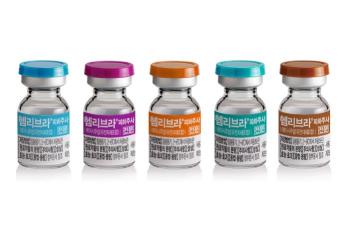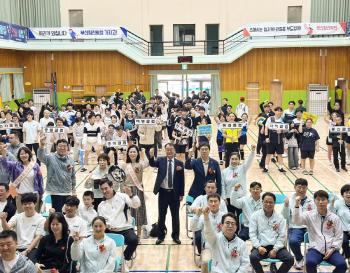Antibody-mediated rejection after kidney transplantation...Catholic Master Cell Therapy Effect
Sep 03, 2025
Kidney transplant surgery is the only treatment for chronic renal failure patients. However, even if a difficult kidney transplant is successful, the transplanted kidney function can be lost if chronic antibody-mediated rejection gradually attacks the cells of the transplanted organ with the patient's antibodies.
Researchers at the Seoul St. Mary's Hospital Organ Transplantation Center/Xinology Department (Jeong Byeong-ha of the Department of Nephrology at Seoul St. Mary's Hospital, Oh Eun-ji of the Department of Diagnostic Laboratory Medicine, Kim Hyung-deok of the Department of Nephrology at Eunpyeong St. Mary's Hospital, and Park Hye-ran of the Department of Nephrology at St. Vincent's Hospital) announced that the treatment of human bone marrow-derived mesenchymal stem cells (Catholic master cells) is safe and effective for kidney transplant patients diagnosed with chronic antibody-mediated rejection.
Chronic antibody-mediated rejection is known to be the most important cause of transplant kidney function loss after kidney transplantation, resulting in the gradual loss of transplant kidney function due to allogeneic antibodies that occur after kidney transplantation.
The study conducted a clinical study in which Catholic Master Cell, a therapeutic human bone marrow-derived mesenchymal stem cell developed and manufactured by the Catholic Cell Treatment Project, was administered four times every two weeks in seven kidney transplant patients diagnosed with chronic antibody-mediated rejection. The main evaluation index was whether short-term side effects occurred after treatment, along with changes in transplant kidney function, changes in antibodies associated with transplant rejection, and immune cell activity and infection incidence and survival rate were analyzed from various angles.
As a result of the study, no immediate adverse events were observed after Catholic master cell therapy, and a positive effect of moderate rate of decline in transplant kidney function and reduced proteinuria was identified in the treatment group. In addition, immune cell analysis showed signals that improved immune balance, such as an increase in certain T-cell subtypes that play an important role in immune regulation. In particular, there was no statistically significant difference compared to the existing treatment group in terms of infection incidence and transplant kidney survival, suggesting that bone marrow-derived mesenchymal stem cell treatment can be safely performed.
Professor Jeong Byeong-ha of the Department of Nephrology at Seoul St. Mary's Hospital, the head of the study, said, "This study is a treatment for chronic antibody-mediated rejection, and it is significant in that bone marrow-derived mesenchymal stem cell therapy has opened up the possibility as a new immunomodulatory treatment. A large-scale study of more patients and long-term follow-up are needed in the future."
Meanwhile, the organ transplant center of Seoul St. Mary's Hospital has continued to conduct basic, intermediary, and clinical research on the main pathogenesis of chronic antibody-mediated rejection of kidney transplantation and the development of new treatments through joint research with the Department of Diagnostic Laboratory Medicine at St. Mary's Hospital in Seoul, the organ transplant research institute at Catholic University of Korea, and has published several related papers in international renowned academic journals. The study was carried out with the support of research funds from the Advanced Regenerative Treatment Project Group of the Health Industry Promotion Agency and was recently published in Cytotherapy, the official journal of 'International Cell/Genetic Therapy Society'.
Reporter Jang Jong-ho bellho@sportschosun.com
Researchers at the Seoul St. Mary's Hospital Organ Transplantation Center/Xinology Department (Jeong Byeong-ha of the Department of Nephrology at Seoul St. Mary's Hospital, Oh Eun-ji of the Department of Diagnostic Laboratory Medicine, Kim Hyung-deok of the Department of Nephrology at Eunpyeong St. Mary's Hospital, and Park Hye-ran of the Department of Nephrology at St. Vincent's Hospital) announced that the treatment of human bone marrow-derived mesenchymal stem cells (Catholic master cells) is safe and effective for kidney transplant patients diagnosed with chronic antibody-mediated rejection.
Chronic antibody-mediated rejection is known to be the most important cause of transplant kidney function loss after kidney transplantation, resulting in the gradual loss of transplant kidney function due to allogeneic antibodies that occur after kidney transplantation.
The study conducted a clinical study in which Catholic Master Cell, a therapeutic human bone marrow-derived mesenchymal stem cell developed and manufactured by the Catholic Cell Treatment Project, was administered four times every two weeks in seven kidney transplant patients diagnosed with chronic antibody-mediated rejection. The main evaluation index was whether short-term side effects occurred after treatment, along with changes in transplant kidney function, changes in antibodies associated with transplant rejection, and immune cell activity and infection incidence and survival rate were analyzed from various angles.
As a result of the study, no immediate adverse events were observed after Catholic master cell therapy, and a positive effect of moderate rate of decline in transplant kidney function and reduced proteinuria was identified in the treatment group. In addition, immune cell analysis showed signals that improved immune balance, such as an increase in certain T-cell subtypes that play an important role in immune regulation. In particular, there was no statistically significant difference compared to the existing treatment group in terms of infection incidence and transplant kidney survival, suggesting that bone marrow-derived mesenchymal stem cell treatment can be safely performed.
Professor Jeong Byeong-ha of the Department of Nephrology at Seoul St. Mary's Hospital, the head of the study, said, "This study is a treatment for chronic antibody-mediated rejection, and it is significant in that bone marrow-derived mesenchymal stem cell therapy has opened up the possibility as a new immunomodulatory treatment. A large-scale study of more patients and long-term follow-up are needed in the future."
Meanwhile, the organ transplant center of Seoul St. Mary's Hospital has continued to conduct basic, intermediary, and clinical research on the main pathogenesis of chronic antibody-mediated rejection of kidney transplantation and the development of new treatments through joint research with the Department of Diagnostic Laboratory Medicine at St. Mary's Hospital in Seoul, the organ transplant research institute at Catholic University of Korea, and has published several related papers in international renowned academic journals. The study was carried out with the support of research funds from the Advanced Regenerative Treatment Project Group of the Health Industry Promotion Agency and was recently published in Cytotherapy, the official journal of 'International Cell/Genetic Therapy Society'.
Reporter Jang Jong-ho bellho@sportschosun.com
|
This article was translated by Naver AI translator.














